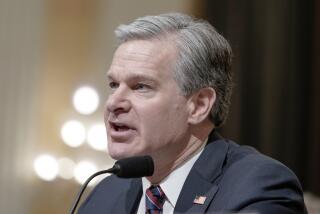But Critics Say Some Arrests Result From Lucky Tips : U.S. Counterspy Efforts Seen Paying Off
- Share via
WASHINGTON — A wave of espionage cases this year, culminating in the arrests of four people on three separate spying charges during the last five days, represents the fruits of a decade’s strengthening of U.S. counterintelligence abilities, some intelligence officials now say.
Those officials credit increased spending on counterspy programs and unusually close cooperation between the FBI and its CIA and Defense Department rivals with the filing of espionage charges against 11 persons so far in 1985--the most since World War II.
The latest arrests brought the total number of spying charges lodged since 1982 to 30. Another 20 Soviet and Eastern Bloc officials have been expelled for espionage during the same period, FBI Director William H. Webster said last month.
Successes Disputed
The view that this fat roster of accused spies proves the success of U.S. counterspy programs--and not their failure--is disputed by some intelligence experts, who note that other spectacular arrests, including the breakup of the sprawling spy ring of John A. Walker Jr. this summer, have come largely from lucky tips and not spadework.
Reagan Administration officials, however, contend that the facts paint a brighter picture. “You’re seeing the fruition of a lot of efforts in foreign counterintelligence,” William Baker, assistant FBI director for congressional and public affairs, said Monday.
Intelligence agencies “are learning the deterrent value of prosecutions,” added Stephen S. Trott, assistant attorney general in charge of the Justice Department’s criminal division.
Such successes, Administration officials say, spring, in part, from a buildup of FBI counterintelligence programs begun in 1983 and substantial increases in the counterspy budgets of the Defense Intelligence Agency and other military espionage offices.
Curbs in Soviet-Bloc Activity
Although spending figures are classified, Baker said that the FBI has moved to reverse the unfavorable ratio between Soviet Bloc operatives and agents assigned to counterintelligence. The Senate Intelligence Committee has approved spending increases “in most if not all of the intelligence budgets” it has reviewed, a committee spokesman said.
In another gesture to the new-found importance of counterintelligence, the National Security Council has established a staff of CIA, FBI and Defense Department experts to prepare national assessments of foreign espionage threats.
Experts also say that improved cooperation between intelligence agencies and the FBI, which is legally assigned to investigate espionage cases, has repeatedly paid off in arrests this year.
That closeness has its roots in the administrations of Gerald R. Ford and Jimmy Carter, which changed national policy to order the public prosecution of foreign spies, even when trials risk the exposure of national secrets.
Longstanding rivalries between the FBI and the younger CIA have continued to frustrate the investigation and prosecution of accused spies, but Reagan Administration officials contend that cooperation has improved in recent years. The Senate Intelligence Committee demanded coordination of counterspy efforts among the FBI and intelligence agencies after 1982 hearings disclosed continued problems.
Pollard Case Cited
In at least some cases, the cooperation appears to have worked. Jonathan J. Pollard, charged, along with his wife, with passing military secrets to an unnamed foreign power, was fingered by co-workers at the Naval Intelligence Service after he sought unusual access to secret documents. Earlier, the FBI arrested two persons on charges of spying for Ghana after one of them, CIA clerk Sharon M. Scranage, failed a lie-detector test.
The FBI also stressed the cooperation of the National Security Agency in announcing Monday’s arrest of Ronald W. Pelton on charges of passing NSA codes and other secrets to the Soviet Union.
More to Read
Sign up for Essential California
The most important California stories and recommendations in your inbox every morning.
You may occasionally receive promotional content from the Los Angeles Times.










